Eastern Haane, the People's Confederation of
-
Official Name: The People's Confederation of Eastern Haane
Capital: Kiel (legislative, executive, judicial), Strasbourg (control)
Official Languages: German, French, Dutch, Danish, English.
Government: Semi-presidential socialist republic.
Legislature: Bicameral; the Syndical Assembly and Assembly of nations
Head of State: State Elder Mathilde Comtois
Head of Government: Premier Katrin Weber
Basic historical facts:
founded: 15 November, 1918, as the Council Republic of Eastern Haane
current constitution: 6 May, 2020
establishment of the General Council and the Supreme Councillorship: 14 May, 1952
EU membership: 7 April, 2020
-
During the Great Terror (1934 - 1946), during which Eastern Haane was placed under an authoritarian quasi-dictatorship, the guild system was instated, in an attempt to increase social capital, establish professional norms, and allow for the representation of groups that had previously been ignored by the government.
It was and is quite simply to create a guild - one requires only the approval of 500 people. As a result, their number is astronomically high - in the hundreds, representing a diverse number of highly specific professions. However, in the modern day, they are viewed with derision - despite their role in maintaining social welfare and solidarity, many see them to be simply a vestigial remnant of the old regime.
With the revolution, they have been superceded by the syndicates.
-
The Government of the Confederation
Representing the state as a whole is the State Elder of the People's Confederation. Whomsoever occupies this role is the face of the nation to the outside world, defining foreign policy and attending inter-national meetings as a representative and having the power to 'veto' bills, although said 'veto' simply begins a series of meetings with whatever chamber of the legislature passed the build, which only end once consensus is reached.There exists a separate head of government - a Premier - who is advised by a Confederal Council. Whomsoever occupies this role has the responsibility of presiding over meetings of either legislative chamber as well as directing the execution of laws, and is elected by the combined legislative chambers.
The legislative assembly itself has two chambers - the Syndical Assembly and the Assembly of Nations. The Syndical Assembly has (or will have) 772 members, with one for each syndicate/profession (the former guilds). It shall have full power to regulate over everything in the field of the economy, defining professional norms and drafting quarterly economic planning.
On the other hand, the Assembly of Nations will be composed of 280 members, with ten from each nation, and shall propose legislature on all social matters, including welfare, marriage, and crime.
Delegates to each will be bound to the mandate and demand of their constituents; they cannot act without instructions.
In reality, however, the nations and syndicates will generally propose legislation that affect only themselves in their own assemblies, independent of the confederation, but according to the principles already set out. The situation described above will only occur if greater coordination is necessary, if there is a dispute between nations or syndicates, or if the nations or syndicates themselves declare it necessary by consensus.
The workers' councils will have the authority to send proposals to the syndicates, nations, and their associated legislative bodies; in addition, they have the responsibility of debating legislature, sending complaints and suggestion to the assemblies. They also enforce the laws passed by the various legislative bodies, and own and manage all property.
Each will elect a "People's Court," responsible for trying anything that is an offence against the people - enumerated in the General Code of Eastern Haane.
Whenever there is a dispute that involves the constitution or the nation as a whole, a solution will be deliberated by a 'Congress of People's Courts,' made up from representatives from each People's Court.
The Congress of Workers' Councils will act as an ombudsman, overseeing the rest of the government and ensuring that it is for the people. It holds full powers of impeachment.
Elections to any of these bodies may be contested by trade unions, but none else.
The syndicates and nations, as in the past, will be participatory and deliberative, with mass meetings in every municipality where applicable.
-
Composition of the General Council and the Corporate Chamber
General Council:
Corporate Chamber:
-
The Corporate Chamber of Eastern Haane consists of 792 representatives - one for each of the 774 guilds, 11 nations, 4 republics, and 3 free territories. However, their votes are not equal - representatives vote en bloc, with one vote allocated to the guilds, one to the nations, one to the republics, and one to the free territories.
The Chamber, however, has little to do; although it has the power to, it does not pass legislation, as such a thing is generally done by the General Council.
However, it has, since the delegation of power in 1951, repeatedly attempted to pass constitutional amendments to more clearly define governmental roles and powers, as well as to get rid of redundant structures. However, these amendments require approval by the General Council - although they were approved by referendum between 1934 and 1951, the delegation of power has changed precedents - which has always rejected them.
This situation, in recent years, has led to a decline in popularity for the previously dominant Solidarity Bloc.
With the revolution, however, the chamber has assumed full legislative powers as a provisional government; however, it will be dissolved permanently with the elections to the State Eldership, Syndical Assembly, and Assembly of Nations.
-
There are 100 seats in the General Council, elected through proportional representation every four years. Members have the responsibility of passing legislation on the behalf of the people of Eastern Haane, and ensure they do so by creating commissions.
These commissions have the power to do the following:
request and expect polling data from any polling organization in Eastern Haane
call assemblies of the people as to record discussion and opinions
request and expect any relevant data from the government.
in addition to other powers specifically given to them by the General Council.
-
Districts of Eastern Haane
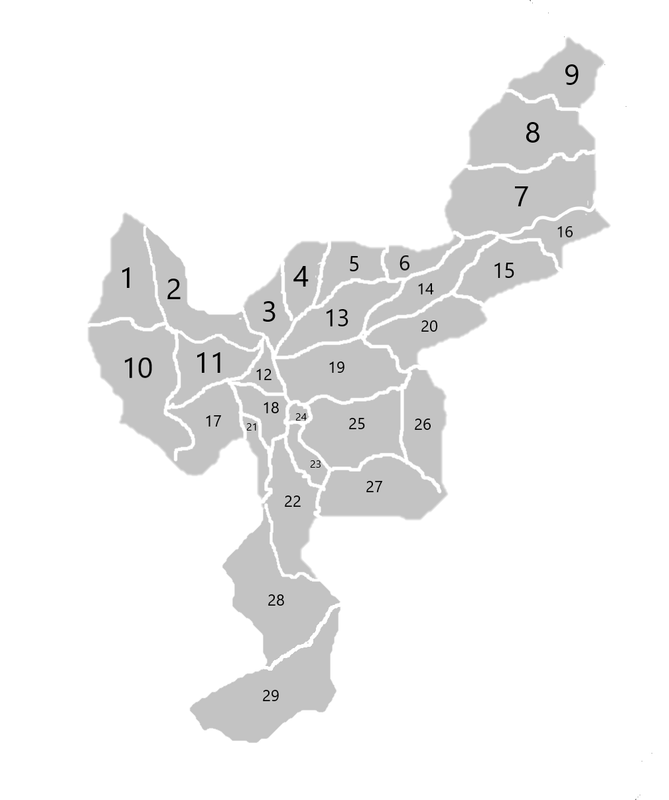
- Côte de Calais (capital: Calais; urban)
- Nord (capital: Lille; urban)
- Marne (capital: Marne; rural)
- Utrecht (capital: Utrecht; urban)
- Rotterdam/The Hague (capital: The Hague; urban)
- Groningen/Amsterdam (capital: Groningen; rural)
- Kiel (capital: Kiel; urban)
- Kolding (capital: Kolding; urban)
- Skagen (capital: Skagen; urban)
- Laon (capital: Laon; rural)
- Amiens (capital: Amiens; rural)
- Mezieres (capital: Mezieres; rural)
- Eindhoven/Arnheim (capital: Eindhoven; rural)
- Bremen (capital: Bremen; rural)
- Hamburg (capital: Hamburg; rural)
- Rostock (capital: Rostock; urban)
- Beauvais (capital: Beauvais; rural)
- Reims (capital: Reims; rural)
- Muenster (capital: Muenster; rural)
- Hannover (capital: Hannover; rural)
- Bar (capital: Bar; rural)
- Metz (capital: Metz; rural)
- Nancy (capital: Nancy; rural)
- Luxembourg (capital: Luxembourg City; rural)
- Rosa-Luxemburg Stadt (capital: Rosa-Luxemburg-Stadt; urban)
- Arnsberg (capital: Arnsberg; rural)
- Aachen (capital: Aachen; rural)
- Strasbourg (capital: Strasbourg; urban)
- Mulhouse (capital: Mulhouse; urban)
-
Typologies and Architecture of Eastern Haane
In general, Eastern Haane was shaped by the modernist movement of the 1920s and 30s. This is reflected in the dense configuration of its cities and villages, in which individual houses do not exist at all:
The village of Briey, in the district of Meurthe et Moselle

Plan for the city of Calais, in the district of Côte de Calais
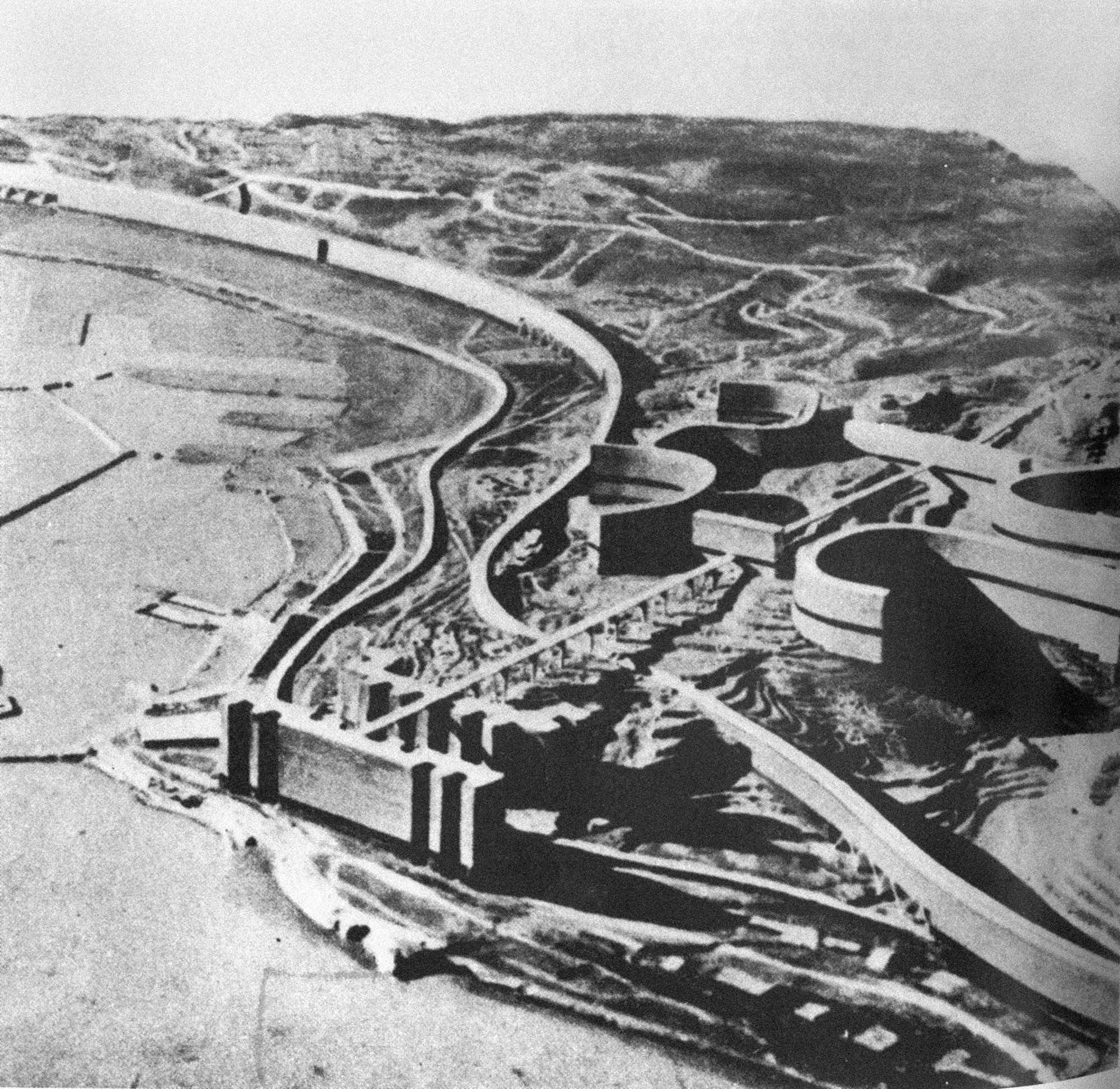
© FLC-ADAGP'Standard Model' of Housing

© FLC-ADAGP
Plan for the City of Strasbourg
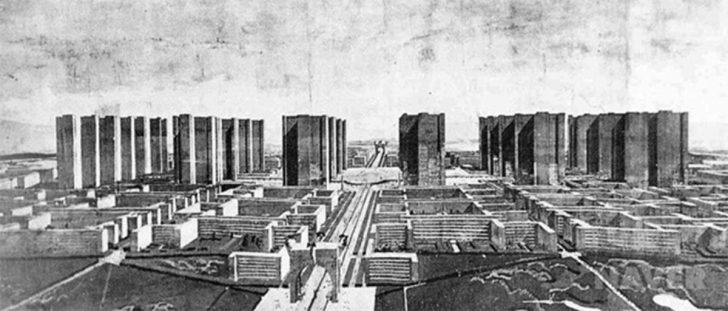
© FLC-ADAGP
Rosa-Luxemburg Stadt
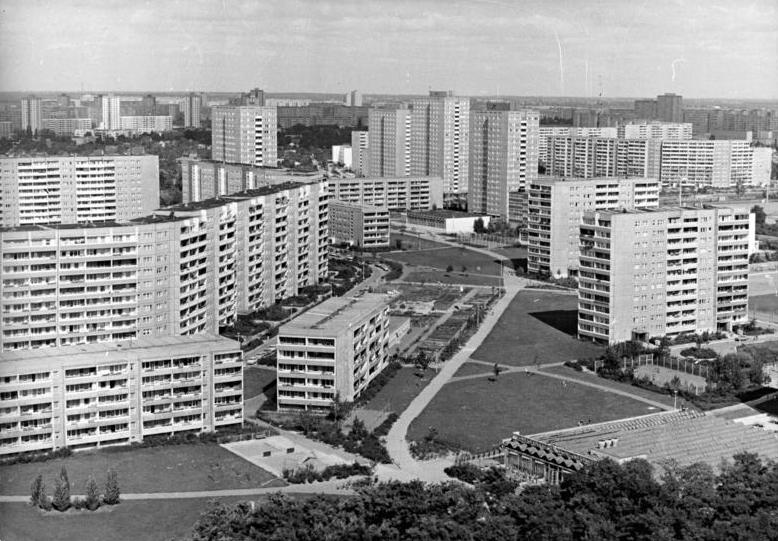
'Standard Model' for villages smaller than 300 residents
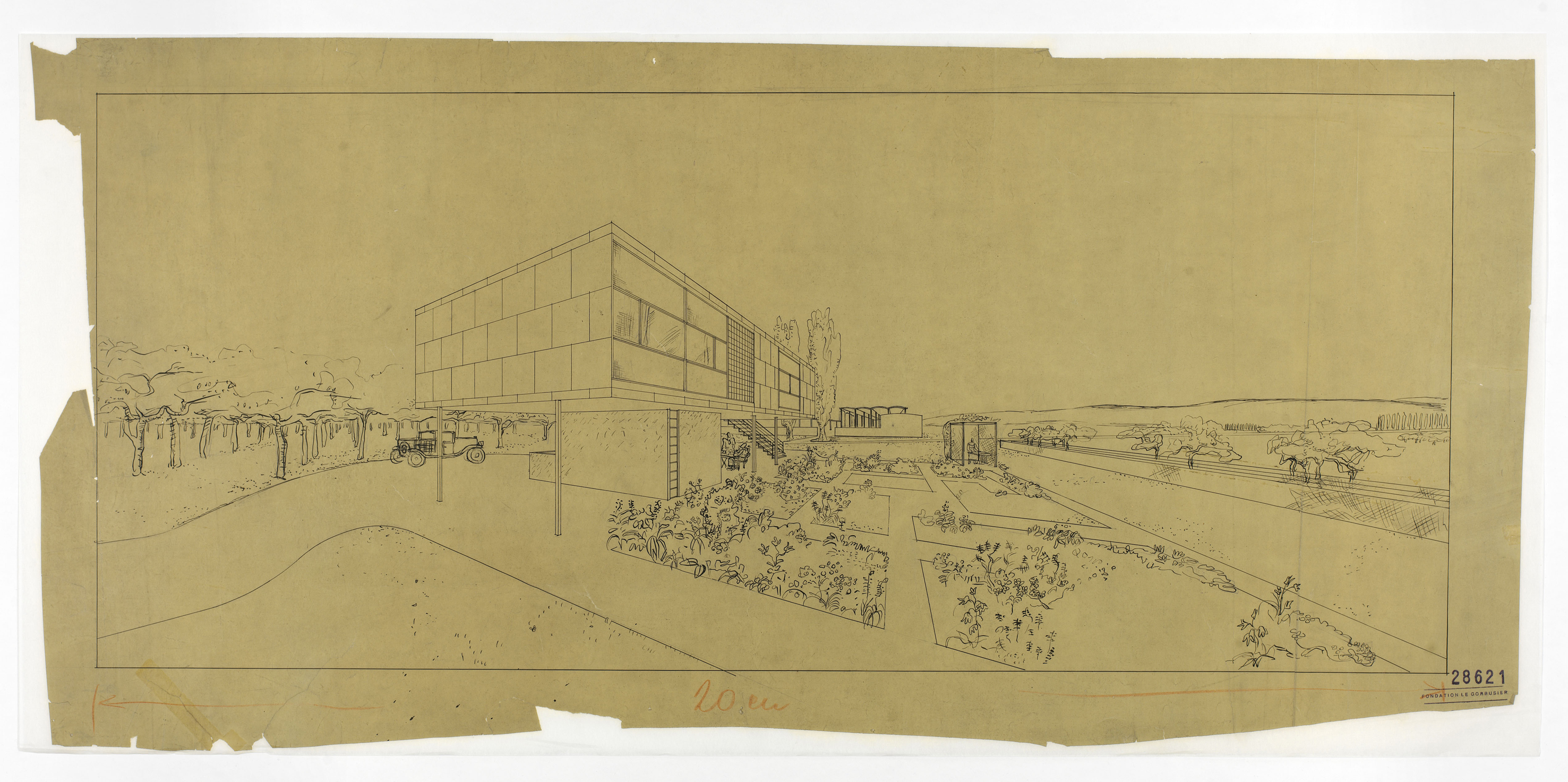
© FLC-ADAGP
Amsterdam

Town near Rotterdam, Rotterdam/The Hague district
Haanean farms, built on the vast grasslands of the "Haane" are themselves isolated from the cities. Collectivized, they are centered around central offices, as below:
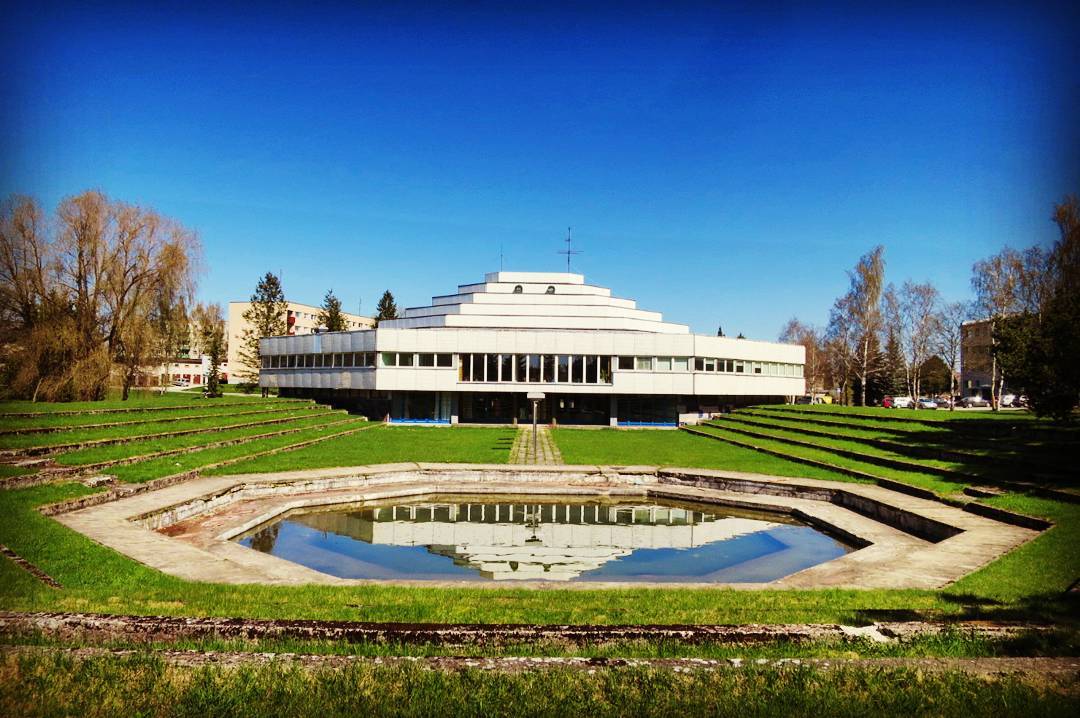
Workplaces, known as 'production collectives' in the jargon of Eastern Haanean law, follow a similar patterning, themselves isolated from other portions of the city and centered around a central hall, operated by the syndicate for the use of all:
The buildings of the Bauhaus school and production collective

By M_H.DE - Own work, CC BY 3.0, https://commons.wikimedia.org/w/index.php?curid=27000202
The ideology driving this style of architecture was that of a sort of democratic collectivism, in which society; although monolithic and comprised not of individuals but corporate group; at its base was made up of individuals, each of whom had to be taken care of as to ensure the success of the whole.
-
The History of Eastern Haane - the Socialist Period
The world was a very different place in 1890. Conditions were much worse, with much of the working class living in squalid conditions unimaginable to the modern individual.
Socialism was of the greatest interest; intellectuals all over the world writing theory, members of the proletariat protesting, revolting.
The great powers of the time were terrified. Of course, they could not execute all the socialists - such a thing would horrify the liberal population, making matters only worse than they were.
As such, they drafted a plan - to send their most devoted socialists to an uninhabited land far, far away. They would be given as much as needed to satisfy them, lest they continue to propagandize in anger.
It was thus that Eastern Haane - then the 'eastern Haane,' or the 'east of the Haane' was founded. Nearly 30,000 individuals were sent to its empty shores in the hastiest of manners.
Initially, the territory was divided among the four principal powers, of French, German, Danish, and Dutch ethnicity. In 1910, each would gain full independence. However, it was only in the November of 1918 that the four unified to create a "Council Republic of Eastern Haane."
This polity was not as authoritarian as other socialist states; it was perhaps the most libertarian of them all, with citizens entirely free to express their opinions in any way they saw fit, whether it was through their representatives bound to their will, the newspapers open to public submissions, or their own voices. (Theorists in the modern-day have claimed that this was only due to the relative ideological conformity of the early state; that, at the time, the only worry was excessive sectarianism.)
However, political opinion began to diverge. By 1925, Eastern Haane had developed three distinctive political currents:
- the syndicalists, who wished for a state organized by professions
- the councilists/council communists, who wished for the state as it was
- the vanguardists, who believed that the state was in a precarious position and had to be replaced with a new, single-party based system.
In 1927, the syndicalist current had prevailed, a new state, a "Syndical Republic" being formed.
This state, however, was troubled. The syndicalist movement became progressively unstable, splitting into two:
-
the National-Syndicalists, who were socially conservative and anti-democratic
-
the democratic Syndicalists, who were highly democratic and very socially leftists.
Arguments between the two began . to tear up the state. While the economy continued to function, no progress could be made on the social front. There were several coup attempts by both sides in this time; none, however, were successful.
In 1933, the situation had escalated into street warfare. Bloc paramilitaries were almost daily fighting; the nation was effectively in civil war.
A solution was proposed in August of that year - the state would transition to a parliamentary, semi-direct democratic system. This proved to be even more unstable than the last, with parliament being divided into four political parties of equal size, unable to form coalition, with voter-turnout in referendums and elections being, at the highest, 32%.
The situation had entirely collapsed just a few months later, in 1934. The left-political blocs, threatened by paramilitaries and a failing electoral system, plotted a coup in which they would temporarily install a dictatorship as to stabilize the situation.
This was successful; with it came the 1934 constitution, written as to make it as difficult as possible to express complaint through government organs, and the Great Terror.
The leftist dictatorship, however, lasted only until 1937, at which point national-syndicalists took control of the state apparatus. Their named Consul was proclaimed Emperor; with that began the 'imperial' period within the terror.
They began a program in which aspects of the previously socialist system were removed; districts were renamed after the provinces of the 'home' countries, language was reformed, and certain names were banned.
In 1939, a group of left-nationalists, ostracized by both parties, met secretly in Skagen. Their final decision was bold; they were to proclaim a 'People's State,' drafting a new constitution which would free the people of Eastern Haane.
They did so; several members of the meeting, as such, were executed. However, it began a greater revolution. Two constituent republics - the French and Danish Council Republics - using constitutional power, seceded from the 1934 Confederation to join the People's State.
It was thus that civil war truly began. Although mostly confined to the borders between the Confederation and People's State, almost 150,000 people would perish.
In 1946, however, with the assassination of the Emperor by his wife, the terror finally ended. A country-wide referendum was held on the future of the Confederation; it ended with the decision to reunify under the Confederation.
A new government was sworn in; it began the process of re-socializing the economy and rebuilding the nation.
However, the structure of the Confederation worried many. It did not allow for proportional representation; in fact, it greatly distorted electoral results through its bizarre functional constituencies.
Public opinion continued to swell against the legislature's makeup until 1951, when a referendum was held to create a new upper-chamber for the legislature, which would be elected proportionally, while also giving some of the Consul's power to a new "Supreme Councillor."
Nearly 88% of all votes were in favor of the reform, the members of the upper chamber - the "General Council" - taking office later that year.
This system remained in place until 1966, when the Liberal Party took control of the entire government.
Economic liberalization took place immediately; almost everything soon fell under the control of 10 oligarchs. Average income fell dramatically as income inequality soared. Shortages were common in that time; any protests were quickly squashed by company paramilitaries.
Corruption became common as the government lost its previous power; after 1970, it became little more than a cardboard prop.
By 1980, Eastern Haane's infrastructure had become decrepit. Poverty was commonplace; no elections had been held since 1972. It was in this year that agitation by the United Communist Party, formed from the many leftist groups of the 1950s and 60s, finally succeeded. The people rose up in rebellion, seizing the factories and farms. Plenipotentiaries for the oligarchs were arrested, sometimes killed; the country was engulfed, yet again, in street warfare between revolutionaries and the oligarchs' paramilitaries.
The violence continued until 1996, when what remained of the legislature of 1972 convened. Nearly half of the country's industry had been destroyed at that point; one fourth of all farmland, by the order of the oligarchs, had been salted.
The legislature intermediated a meeting between the oligarchs and the revolutionaries; they came, finally, to a resolution, in which the economy would be managed through tripartism, the General Council becoming the sole legislative chamber, and the Corporate Chamber being maintained for the creation of constitutional amendments.
This arrangement did not last; tripartism led to a form of factionalism which engulfed Eastern Haane, with strikes and lockouts occurring on a near weekly basis. Production fell to half of what it was in 1990; many Eastern Haanean families were in danger of starvation.
The situation continued to degrade from that point on; by 2001, the country was on the brink of returning to the violence of the 1980s.
That year, the General Council passed a law that would break up the many monopolies. The oligarchs attempted to resist, sometimes by force; however, in the end, they were forced to leave the country, taking with them their wealth.
The country never recovered from this; the oligarchs had held so much wealth that the country had become unable to import any goods without their help.
However, the economic system became much more stable, albeit much smaller than before. Eastern Haaneans could expect that their needs would be met; however, because of the loss of importation, much less could be produced.
As time went on, however, popular opinion began to turn against the state electoral system. Almost all legislatures above the municipality were only indirectly elected; many citizens began to worry that their voices were being drowned out or ignored.
From this began the first parliamentary movement, for the abolition of the council-system.
Many more devoted socialists and communists protested, arguing that the system would better represent the people, as representatives were bound by a popular mandate; however, by 2005, all four republics had adopted a parliamentary system.
With this began a gradual move to the right. Solidarist politics, last seen during the Imperial period, became the new normal. The once-centrist parties of the previous era - the Socialist Workers' Party, for example - became far left - small minorities.
By 2010, a dominant-party system had formed, the solidarists holding almost all state power. The people were generally satisfied with them; the approval rating of the party never went below 60%.
However, in 2013, Eastern Haane was met with freak storms that entirely destroyed the year's crop, at the same time causing damage to an already weak industrial base.
The solidarists' economic policy here began to show its weakness. Autarky, which had been pursued since 2001, could no longer work. Yet because of the protectionist policies put into place by the government, the country did not receive aid.
The country was again on the brink of famine, and the people began to turn against the ruling government
While the country had generally been repaired by 2014, the solidarist vote share steadily decreased. Parties on both the left and the right formed electoral alliances in an attempt to take advantage of this trend.
In 2016, the Consulship fell under the control of Socialist Workers' Party member Katrin Weber - a sign of things to come.
By 2019, the solidarists had lost their majority in the Corporate Chamber, beginning an era of co-habitation.
The Chamber time and time again attempted to reform the poorly written Constitution of 1934; yet each time, the General Council would veto it.
In 2020, a voting year, the solidarists had lost almost their entire base. The leadership was desperate; yet, it refused to change, instead planning to distort the political system entirely.
It was in that year that among the widest constitutional reforms, which would allow for better social welfare and a more streamlined state, were proposed. Several weeks were given for debate in the General Council by the Consul; yet the Council simply held an 'unofficial' vote to dismiss them within days of receiving the amendments.
The people rose up in anger, the country falling into their control. The legislature of the French Council Republic began the process of the dissolution of the Confederation, a move approved by the Corporate Chamber only a day later.
Within a week, a new state - the current People's Confederation - had been formed.
-
The Coastal Urban Agglomeration
The majority of Eastern Haane's cities are located on the coast. Designed in accordance with modernist principles, they are strictly zoned, composed of vast forest-like gardens, monoliths of glass and concrete occasionally rising from the depths.
From west to east, they are as follows:
- Calais
- Lille
- Namur
- Ghent
- Antwerp
- Maastricht
- Rotterdam
- The Hague
- Delft
- Utrecht
- Amsterdam
- Gronigen
- Leeuwarden
- Bielefeld
- Der Hafen
- Kiel
- Flensburg
- Fredericia
- Kolding
- Esbjerg
- Randers
- Skagen
Despite their number, most of these cities have a population of below 500,000. Most are situated over two kilometers from the coast, a large part of which is protected.
-
The Southern Urban Agglomeration
A second urban agglomeration, although smaller than that on the coast, winds through the center of Eastern Haane. It, too, is strictly modernist; however, they are generally more agrarian, with the ground below the stilted buildings covered in farms.
From south to north, it is as follows:
- Mulhouse
- Colmar
- Strasbourg
- Metz
- Aachen
- Nancy
- Luxembourg City
- Reims
- Mezieres
- Amiens
Between these cities are scattered apartment buildings, usually in the Brutalist style; the majority are within one kilometer of each other.
-
The History of Eastern Haane: The Native Period
Human settlement in Eastern Haane is believed to have begun with the movement of the Haanean people - of unknown ancestry - into the region, in about 10,000 BC. Initially nomadic, the drainage of the lake to the north with the opening of the 'Underground River' - a series of caves stretching between the modern-day New Lake and the Mediterranean Sea - gave a constant source of water to the inland regions, thus allowing for the development of farming by 1500 BC.
A small civilization began to develop; it reached its crux at the beginning of the first century AD. Little is known about it, as its script remains unattested; however, it appears to have been relatively egalitarian and centralized.
It would collapse about 200 years later with the closing of the 'Underground River.' This event was marked as an apocalypse by the Haaneans, becoming a major part of their monotheistic religion, often compared to Zoroastrianism.
The Haanean people began to cluster around the coast of the re-formed lake, regressing into a simple farming culture.
They continued in this way until between 900 and 950 AD, when a group of Finnic peoples - today referred to as the 'Kestean' people - arrived in what is modern-day northern Eastern Haane.
The Kesteans were largely nomadic, although pastoral; they generally lived at peace with the Haaneans.
By 1350 AD, a united government for both the Kesteans and Haaneans had been created - a dual-monarchy. Basic civilization again began to rise with the second opening of the Underground River; by 1550 AD there had developed a complex system of cities.
The two did not share a common religion - the Kesteans practiced what is known today as 'gnostic-animism,' believing that everything held a specific essence, united through a strange concept that could only be truly known through what is today compared to the proto-Christian idea of 'gnosis,' while the Haaneans, as said before, held their belief in a monotheistic God similar to that of Zoroastrianism. However, from surviving folktales, it appears that the two held similar histories - both laid emphasis on an apocalyptic event. For the Kesteans, this was the 'Revolt of the Earth,' in which they had abused all things so much to the point that nature itself began to revolt. According to the legend, demons created from the 'united essence' - corrupted through their actions - undertook a massacre of the Kestean people. They thus had to refound their relations with everything as to restore the natural balance and the true essence. The Haaneans held a similar belief, believing that the closing of the 'Underground River' was itself the punishment of God for their rejection of his principles of 'stewardship.'
However, near the peak of Haanean civilization, foreign incursion began. Perhaps the most famous of these were missionaries from Inquista, who attempted to, sometimes forcefully, convert Haaneans and Kesteans to Inquistan Orthodoxy. This culminated in the establishment of short-lived 'missions,' where many were forced to work as slaves.
The Haanean-Kestean state eventually repelled the Inquistans; however, they did not survive the invasion of the 'great powers' that would establish modern Eastern Haane.
These powers, setting out to convert the Haaneans and Kesteans to Christianity, also set up missions. These were much more brutal and much more long-lasting than those of the Inquistans. However, they were not able to subjugate entirely the original state or its people, many of whom remained independent until the arrival of the socialists in 1890.
In 1899, a treaty between the socialists and the Haanean-Kestean government was made, guaranteeing both sides complete sovereignty. This treaty is still in force; however, adjustments have been made to ensure that Haane-Keste is represented in the European Union, by proxy of the Eastern Haanean state.
-
Where is Western Haane?
Nowhere. It has never existed. The very reason for the name 'Eastern Haane' was to ensure that a 'Western Haane' was not implied.
The word 'Haane' referred to a limited area that was 'caretaken' by the native Haanean people.
This limited area not only included the land they were native to but also the areas which they traded with and thus had influence over, an area which stretched as far south as the Mediterranean and as far west as the modern-day 'Malbory River.'
Because modern-day Eastern Haane was only a fraction of this vast territory, which contained a number of regional military powers, its socialist founders had to be very careful not to give a name to it that would allow for others to allege an irredentist agenda and thus invade.
It was thus that the name 'Eastern Haane' was to chosen, to imply that it only occupied and wished to occupy the eastern portions of the geographical Haane, and was not divided, as 'East' would imply.
If various other 'Haanes' existed, they would occupy the following countries:
'Western Haane' would exist across a large swathe of terra nullius as well as part of Malborya.
"Southern Haane" would also occupy terra nullius as well as all of Inquista and part of Red Croatia.
"Northern Haane" would be under a lake.
'